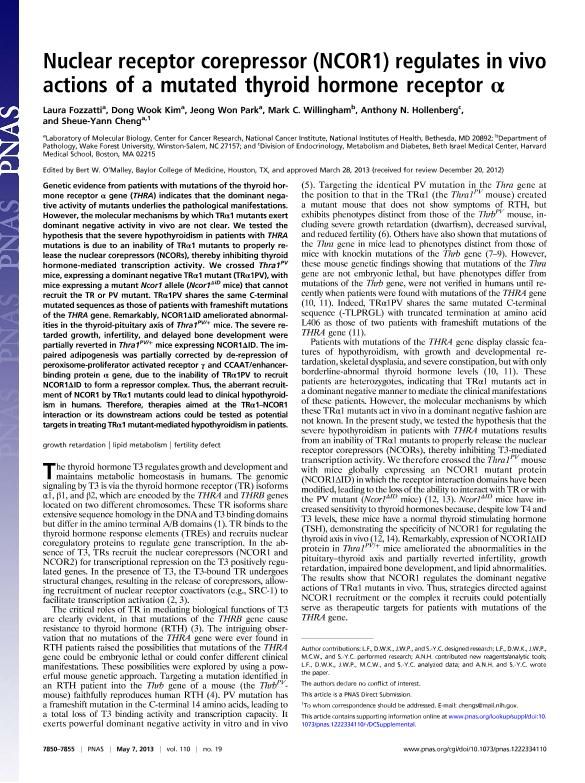Mostrar el registro sencillo del ítem
dc.contributor.author
Fozzatti, Laura

dc.contributor.author
Wook Kim, Dong
dc.contributor.author
Park, Jeong Won
dc.contributor.author
Willingham, Mark C.
dc.contributor.author
Hollenberg, Anthony N.
dc.contributor.author
Cheng, Sheue Yann
dc.date.available
2017-08-28T20:45:41Z
dc.date.issued
2013-05
dc.identifier.citation
Fozzatti, Laura; Wook Kim, Dong; Park, Jeong Won ; Willingham, Mark C.; Hollenberg, Anthony N.; et al.; Nuclear receptor corepressor (NCOR1) regulates in vivo actions of a mutated thyroid hormone receptor α; National Academy of Sciences; Proceedings of the National Academy of Sciences of The United States of America; 110; 19; 5-2013; 7850-7855
dc.identifier.issn
0027-8424
dc.identifier.uri
http://hdl.handle.net/11336/23186
dc.description.abstract
Genetic evidence from patients with mutations of the thyroid hormone receptor α gene (THRA) indicates that the dominant negative activity of mutants underlies the pathological manifestations. However, the molecular mechanisms by which TRα1 mutants exert dominant negative activity in vivo are not clear. We tested the hypothesis that the severe hypothyroidism in patients with THRA mutations is due to an inability of TRα1 mutants to properly release the nuclear corepressors (NCORs), thereby inhibiting thyroid hormone-mediated transcription activity. We crossed Thra1PV mice, expressing a dominant negative TRα1 mutant (TRα1PV), with mice expressing a mutant Ncor1 allele (Ncor1ΔID mice) that cannot recruit the TR or PV mutant. TRα1PV shares the same C-terminal mutated sequences as those of patients with frameshift mutations of the THRA gene. Remarkably, NCOR1ΔID ameliorated abnormalities in the thyroid-pituitary axis of Thra1PV/+ mice. The severe retarded growth, infertility, and delayed bone development were partially reverted in Thra1PV/+ mice expressing NCOR1ΔID. The impaired adipogenesis was partially corrected by de-repression of peroxisome-proliferator activated receptor γ and CCAAT/enhancer-binding protein α gene, due to the inability of TRα1PV to recruit NCOR1ΔID to form a repressor complex. Thus, the aberrant recruitment of NCOR1 by TRα1 mutants could lead to clinical hypothyroidism in humans. Therefore, therapies aimed at the TRα1–NCOR1 interaction or its downstream actions could be tested as potential targets in treating TRα1 mutant-mediated hypothyroidism in patients.
dc.format
application/pdf
dc.language.iso
eng
dc.publisher
National Academy of Sciences

dc.rights
info:eu-repo/semantics/openAccess
dc.rights.uri
https://creativecommons.org/licenses/by-nc-sa/2.5/ar/
dc.subject
Thyroid Hormone Receptor
dc.subject
Growth Retardation
dc.subject
Lipid Metabolism
dc.subject
Fertility Defect
dc.subject.classification
Ética Médica

dc.subject.classification
Ciencias de la Salud

dc.subject.classification
CIENCIAS MÉDICAS Y DE LA SALUD

dc.title
Nuclear receptor corepressor (NCOR1) regulates in vivo actions of a mutated thyroid hormone receptor α
dc.type
info:eu-repo/semantics/article
dc.type
info:ar-repo/semantics/artículo
dc.type
info:eu-repo/semantics/publishedVersion
dc.date.updated
2017-08-24T18:01:37Z
dc.journal.volume
110
dc.journal.number
19
dc.journal.pagination
7850-7855
dc.journal.pais
Estados Unidos

dc.journal.ciudad
Washington DC
dc.description.fil
Fil: Fozzatti, Laura. National Institutes of Health; Estados Unidos. Consejo Nacional de Investigaciones Científicas y Técnicas; Argentina
dc.description.fil
Fil: Wook Kim, Dong. National Institutes of Health; Estados Unidos
dc.description.fil
Fil: Park, Jeong Won. National Institutes of Health; Estados Unidos
dc.description.fil
Fil: Willingham, Mark C.. University Wake Forest; Estados Unidos
dc.description.fil
Fil: Hollenberg, Anthony N.. Harvard Medical School; Estados Unidos
dc.description.fil
Fil: Cheng, Sheue Yann. National Institutes of Health; Estados Unidos
dc.journal.title
Proceedings of the National Academy of Sciences of The United States of America

dc.relation.alternativeid
info:eu-repo/semantics/altIdentifier/doi/http://dx.doi.org/10.1073/pnas.1222334110
dc.relation.alternativeid
info:eu-repo/semantics/altIdentifier/url/http://www.pnas.org/content/110/19/7850
Archivos asociados
